Science
SCIENCE
Overview
Why is it important for students to learn Science?
• To stimulate curiosity in finding out why things happen the way they do. (Curious Minds)
• To develop attitudes/ethics towards community and environment. (Caring Hearts)
• To explore and observe scientific phenomenon in real life. (Creative Spirits)
Approach to the teaching and learning of Science
• Hands-on, Minds-on Approach to Learning Science (Curious Minds)
• Giving a Hand to the Community (Caring Hearts)
• Working Hand in Hand with Collaborative Partners (Creative Spirits)
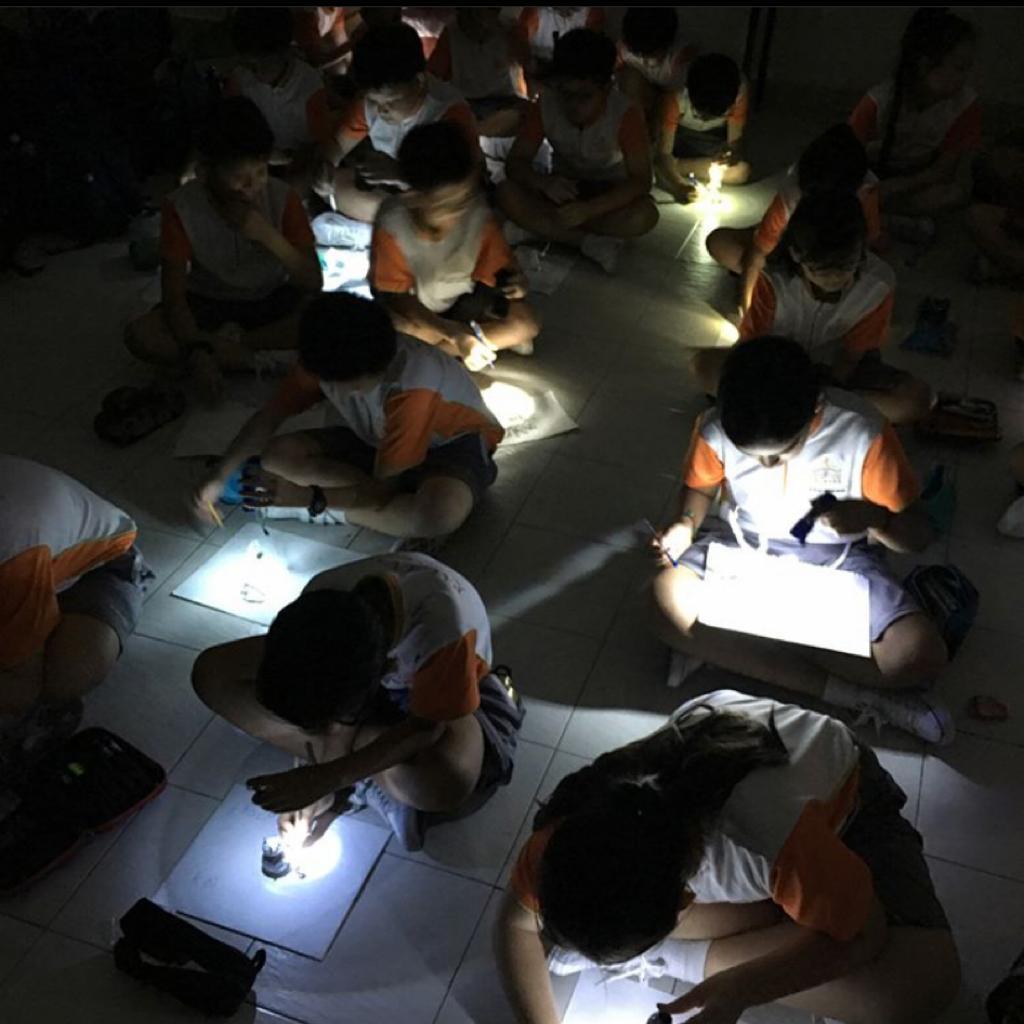
Curriculum
The Science Curriculum Framework is derived from the Policy Framework for the Teaching and Learning of Science. It encapsulates the thrust of science education in Singapore to prepare our students to be sufficiently adept as effective citizens, able to function in and contribute to an increasingly technologically-driven world.
Central to the curriculum framework is the inculcation of the spirit of scientific inquiry. The conduct of inquiry is founded on three integral domains of (a) Knowledge, Understanding and Application, (b) Skills and Processes and (c) Ethics and Attitudes. These domains are essential to the practice of science. The curriculum design seeks to enable students to view the pursuit of science as meaningful and useful. Inquiry is thus grounded in knowledge, issues and questions that relate to the roles played by science in daily life, society and the environment. Students in Palm View Primary School hone their Science Process Skills through experiences gained through our in-house designed programmes.
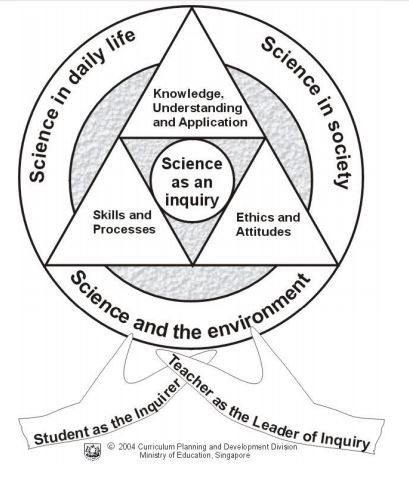
P3 Hydroponics
As part of the Primary 3 syllabus on plants, the Primary 3 students were exposed to the cultivation of vegetables through hydroponics in contrast to the traditional farming methods of growing vegetables in soil. In the course of the 3-week growth cycle, the students observed the development of the vegetables. They were also introduced to the method of organically-grown vegetables as pesticides were not used at any time from transplanting to harvesting. In addition, the hydroponics greenhouse uses solar panels to generate electricity to power the pumps that circulate the nutrient solution, hence reducing the carbon footprint. The cultivation process further motivates students to have a healthy diet by eating more vegetables as well as infuses National Education by creating a sense of awareness that we can be self-reliant and innovative in finding alternative means of growing food in land-scarce Singapore.
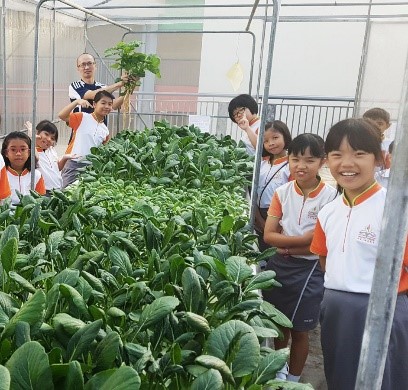
P4 Growing Hearts
Primary 4 students took up the challenge of creating an eco-friendly school environment through the planting of vegetables and reflecting on the related issues facing the world today.
The students worked in groups to collaborate and communicate their research findings on some plants. Using a decision-making process, they had to decide on the plant that they wanted to grow and put together an action plan on how to take care of their plant.
After diligently monitoring the growth of their vegetables, the students then harvested their vegetables. To inculcate entrepreneurial dare, our students sold the harvested vegetables to their fellow students, parents and staff in school. All the proceeds from the sale will be donated to a charitable organisation.
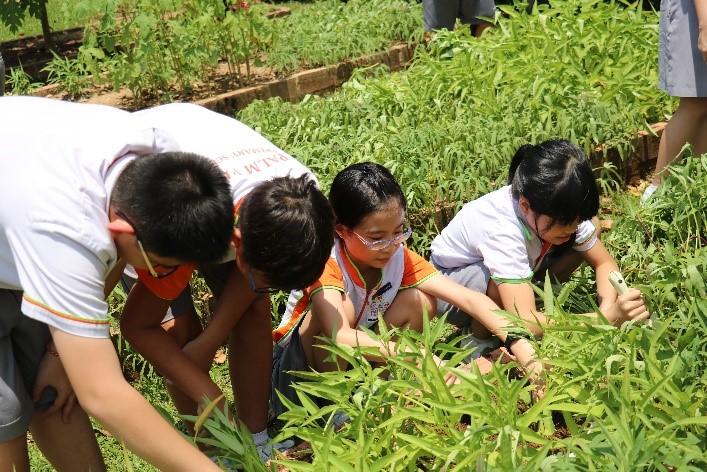
Pedagogy
Palm View Primary School uses two key pedagogical approaches in the teaching of Science; Inquiry-based learning and BSCS 5E Instructional Model.
Inquiry-based learning may be characterised by the degree of responsibility students have in posing and responding to questions, designing investigations, and evaluating and communicating their learning (student-directed inquiry) compared to the degree of involvement the teacher takes (teacher-guided inquiry). Students will best benefit from experiences that vary between these two inquiry approaches.
This approach incorporates the strategies which include the essential features of Question, Evidence, Explanation, Connections and Communication and provide students with experiences that varies between guided (partial) and open (full) inquiry.
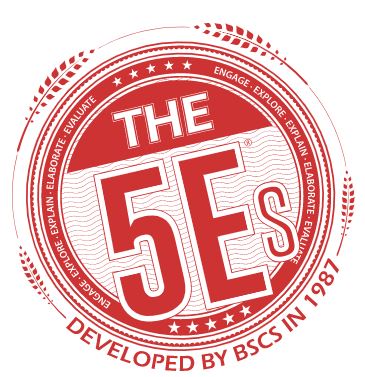
The BSCS 5E Instructional Model which is grounded in sound educational theory, has a growing base of research to support its effectiveness, and has had a significant impact on science education.
• The five phases of the BSCS 5E Instructional Model are designed to facilitate the process of conceptual change.
• The use of this model brings coherence to different teaching strategies, provides connections among educational activities, and helps science teachers make decisions about interactions with students.
• Each phase of the model and a short phrase to indicate its purpose from a student perspective are:
o Engagement - students’ prior knowledge accessed and interest engaged in the phenomenon
o Exploration - students participate in an activity that facilitates conceptual change
o Explanation - students generate an explanation of the phenomenon
o Elaboration - students’ understanding of the phenomenon challenged and deepened through new experiences
o Evaluation - students assess their understanding of the phenomenon
Programmes
Various programmes in Palm View Primary School are designed to allow for students to enjoy science and value science as an important tool in helping them explore their natural and physical world.
Fun Science Demonstration Theatre
- Fun Scientist Programme
To encourage the acquisition of science knowledge, processes and attitudes, the Science Department organises the Fun Scientist Programme (FSP) to inculcate the spirit of scientific inquiry in our lower primary students. Through the use of demonstrations and introductory activities, we aim to gain the students’ attention and peak their interest in finding out more. We wish that by the end of the demonstrations or activities, the students would enjoy and love Science since it is shown as an extension of their natural curiosity. Through these enablers, students should view the pursuit of Science as meaningful and useful. Inquiry is thus grounded in knowledge, issues and questions that relate to the roles played by Science in daily life, society and the environment.
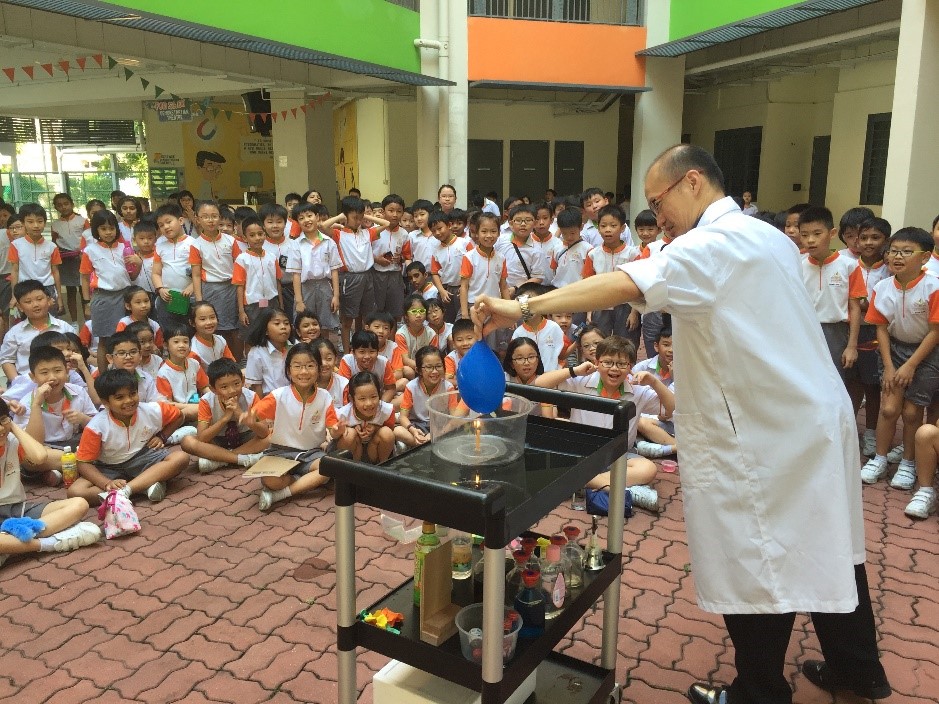
- Science Reading Corner
For Palm View students, the reading corner at the void deck gives a platform where they can spend their break indulging in Science Comics books such as Young Scientist Magazines or Science Facts Magazines such as National Geographic. These act as extra knowledge for students to make meaning to their classroom learning while reading.
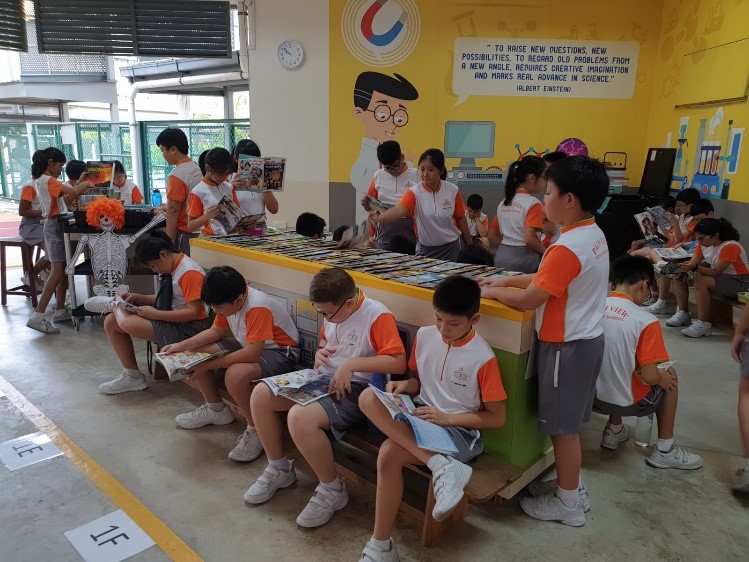
Stellar Nova
Stellar Nova is a programme conducted for the lower primary students. It is conducted termly and aims to get students excited and arouse their curiosity in simple Science phenomena. The infusion of Science into the English curriculum is based on the theme of the big book readers. For example, the book titled “Nightmare in my Closet” focuses on the theme of scary monsters and confronting fears thus the topic of light was brought in to introduce students to shadows.
E2K Science
The E2K Science Programme Singapore is a Science enrichment programme for Upper Primary (Primary 4 to Primary 6) students who demonstrate interest and ability in Science.
E2K Science Programme Singapore is run by teachers in schools who have been trained in the E2K pedagogy. The programme engages students in scientific investigations involving advanced Science concepts. It aims to engage students in scientific inquiry that will help them to develop the habits, attitudes and dispositions scientists possess as well as to gain important 21st century competencies such as critical and inventive thinking and effective communication skills.
Marie Curie Day
Marie Curie Day is a Science carnival-style event held annually to celebrate the achievements of scientists. We hope to spark the spirit of innovation and invention in students and inspire them to be scientists, exercising their Curious Minds and Creative Spirits!
Environmental Education
Environment education initiatives and programmes in Palm View aim to help students understand how their decisions and actions affect the environment, build knowledge and skills necessary to address environmental issues, as well as explore ways that they can take action to keep our environment healthy and sustainable for the future.

